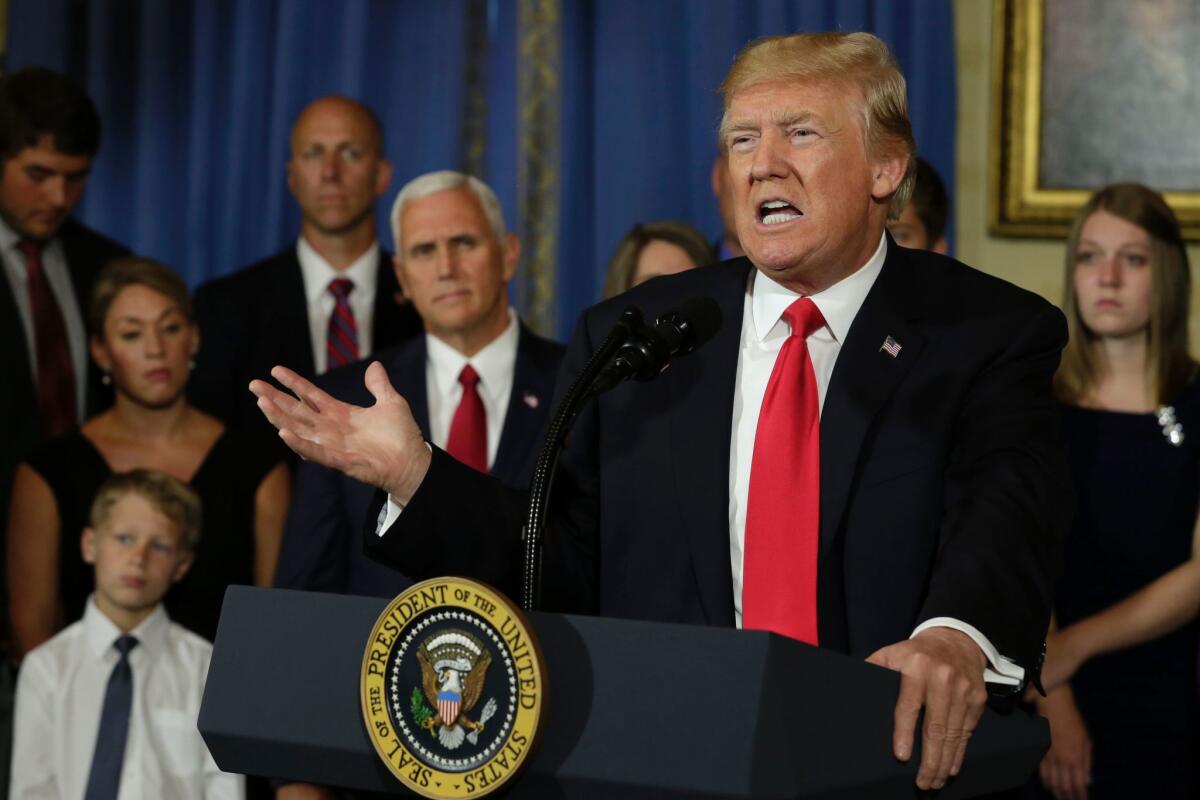Q&A: What are the Obamacare subsidies that Trump is trying to eliminate, and why do they matter?

- Share via
The Trump administration announced Thursday night that it would stop making what are called cost-sharing reduction payments to health insurance companies under the
What are the cost-sharing reduction payments?
The Affordable Care Act set up insurance marketplaces in which Americans who don’t get coverage through an employer can shop among health plans that must all cover a basic set of benefits.
Low- and moderate-income consumers — people with annual incomes between 100% and 400% of the poverty line, so about $12,000 to $48,000 for single people — qualify for subsidies that offset the cost of their monthly insurance premiums.
In addition to those subsidies, the law has another, less well-known, way of reducing costs. Consumers who make between 100% and 250% of the poverty line can get this additional assistance to reduce co-pays and deductibles if they select certain health plans on the Obamacare marketplaces.
Insurers lose money by reducing deductibles and co-pays. The government pays them to make up that cost. Those are the cost-sharing reduction payments.
This year, the CSR payments will cost the federal government about $7 billion, according to the nonpartisan Congressional Budget Office.
How much do the payments reduce costs to consumers?
Someone who might face an annual deductible of $2,000 or more would potentially have no deductible at all.
This additional assistance can be especially important because many health plans with low premiums require consumers to pay high deductibles before their medical care is covered.
Trump healthcare move threatens sharply higher premiums, market chaos »
What’s the legal issue about the payments?
The Obama administration initially sought congressional approval for the payments. After the Republican majority in Congress did not act, the administration determined that the healthcare law gave it the authority to make the payments without an explicit appropriation measure passed by Congress.
Starting in 2014, the government has made payments to insurers every month.
Republicans went to court saying this usurped Congress’ authority over spending. Last year, a federal judge agreed with them. The judge suspended her order while the case was being appealed. The appeal remains pending.
"It’s going to hurt people, it’s going to hurt kids, it’s going to hurt families.”
— Nevada Gov Brian Sandoval
What would happen if the CSR payments stop?
Health insurers and other experts have been warning for months that eliminating the payments could destabilize the Obamacare marketplaces and cause some insurers to stop offering health plans.
If the payments are stopped, insurers would still be required to give low-income consumers plans with small deductibles and co-payments. But insurers would no longer be able to get financial help for the costs they are bearing.
Some insurance companies would likely decide that it was no longer worth selling health plans on the marketplaces. Others might conclude that they have to raise premiums across-the-board to cover the additional losses.
Insurance regulators predict that premiums nationwide will go up an average of 12% to 15% because of Trump’s decision. But the increase in some areas could be much larger.
Would all consumers feel the higher costs?
No. Remember, all this only applies to people who get insurance on the individual market, not to people who get coverage on the job or through a government program.
Even for those on the individual market, people whose incomes are low enough to qualify for subsidies wouldn’t feel much impact because their subsidy would go up as their premium does.
The people who would be hit hardest are those who get insurance on the individual market, but whose incomes are too high to receive subsidies. Ironically, that population tends to lean Republican.
Would cutting the cost-sharing payments save the government money?
No. Because subsidies go up as premiums rise, the Congressional Budget Office estimates that the net impact of eliminating the cost-sharing subsidies would be to increase the cost to the taxpayers.
The cost would be almost $200 billion over 10 years, the budget office estimated in August.
So why does Trump want to do this?
The president and other administration officials have described Trump’s move as a way to put pressure on Congress to agree to some of Trump’s priorities.
“The Democrats ObamaCare is imploding. Massive subsidy payments to their pet insurance companies has stopped. Dems should call me to fix!” Trump wrote Friday in a message on Twitter.
What happens next?
Attorneys general from several Democratic states say they will challenge Trump’s move in court. Some insurers may as well.
In Congress, a bipartisan group of lawmakers already has been trying to negotiate a bill that would give explicit congressional approval for the payments. Whether Trump would sign such legislation remains unclear.
Get the L.A. Times Politics newsletter
Deeply reported insights into legislation, politics and policy from Sacramento, Washington and beyond. In your inbox twice per week.
You may occasionally receive promotional content from the Los Angeles Times.








